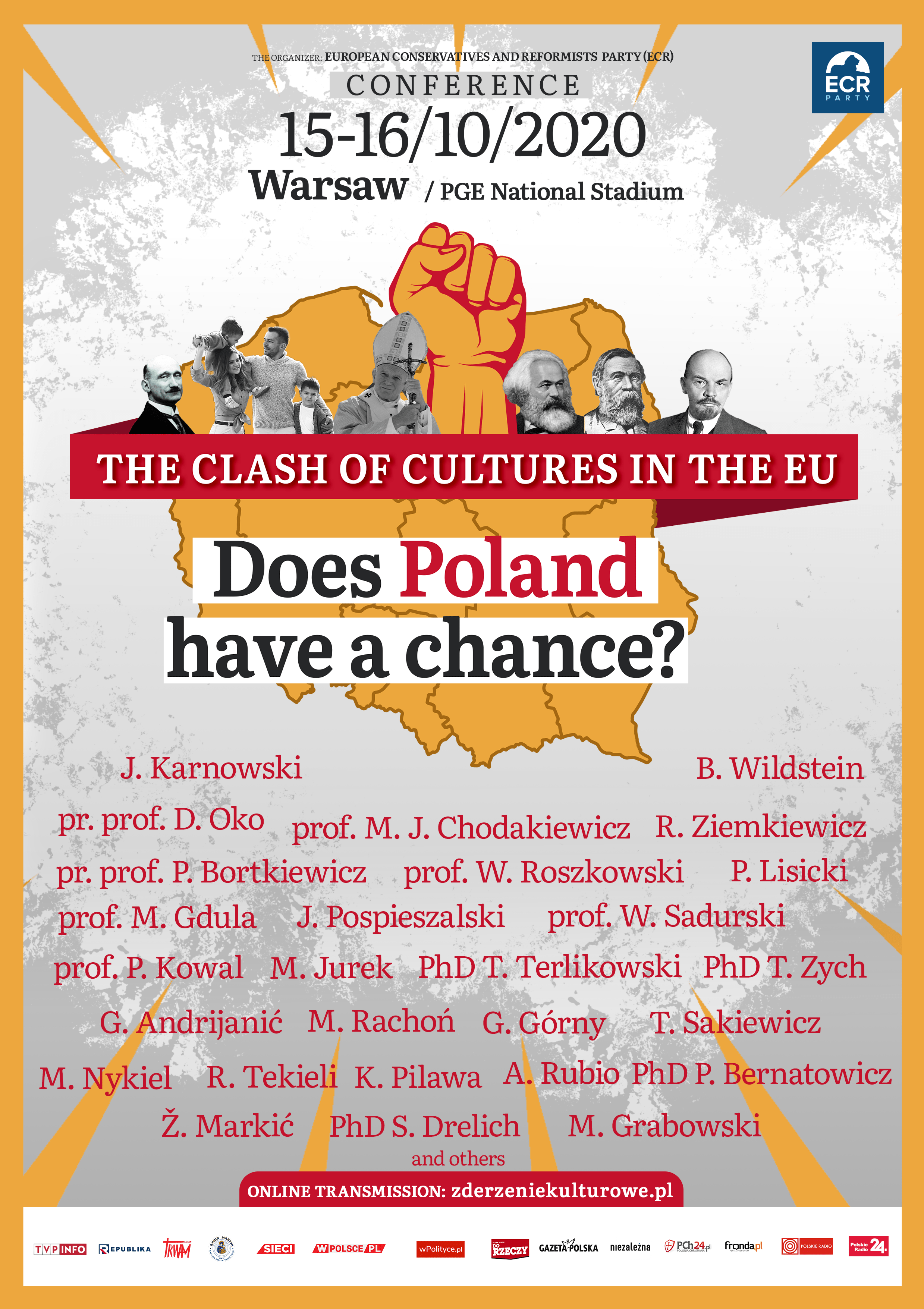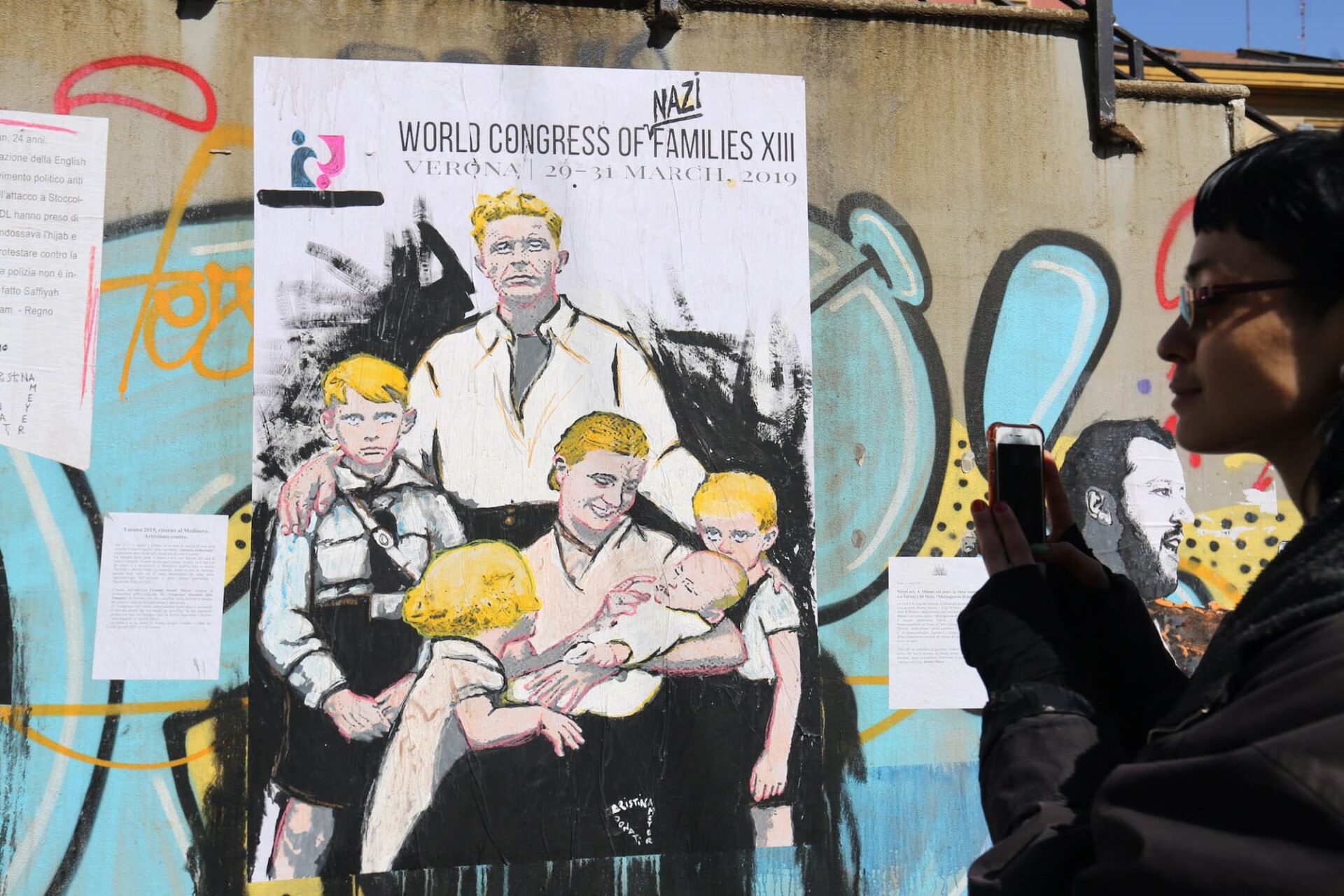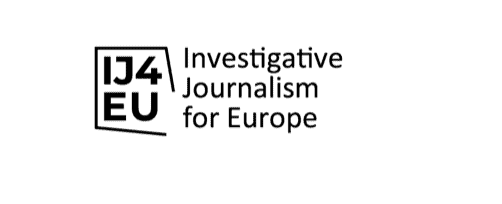A network of organisations affiliated with Ordo Iuris is behind an international opinion sent to the Polish Constitutional Tribunal at the last minute before the verdict. The document may have influenced the Tribunal’s decision to ban abortion.
Julia Dauksza, Anna Gielewska, Konrad Szczygieł (Reporters Foundation, Poland), Tomas Madlenak, Lukas Diko (ICJK, Slovakia), Sarunas Cerniaukas, Migle Kranceviciute (Siena.lt, Lithuania), Masenjka Bacic (Croatia), Audrey Lebel (France)
Shortly after the President of the Constitutional Tribunal, Julia Przyłębska, announced the abortion ruling on 22 October, the chairman of Ordo Iuris switches on his mobile phone as he stands next to the Tribunal’s office in downtown Warsaw. Holding his phone in a slightly trembling hand, Jerzy Kwaśniewski starts a live broadcast. He cannot hide his excitement as he announces victory in a live Twitter broadcast: “We have raised the banner of human rights very high,” he says, clearly very emotional. He thanks members of the parliament, prosecutors, judges, and Ordo Iuris experts and friends who have helped to almost completely block abortion in Poland: “We are fully aware we have had our hand in this victory. We can celebrate now.”
The video on Kwaśniewski’s Twitter account will ultimately receive some 17,000 views. Over the next few days, hundreds of thousands of young people will also march across Poland – a country currently facing a dramatic second wave of the pandemic – outraged by the CT ruling which severely restricts women’s rights.
Wielkie zwycięstwo.
Konstytucyjna prawna ochrona życia rozciągnięta na dzieci chore i podejrzane o chorobę lub wadę genetyczną.
Wysoko podnosimy sztandar praw człowieka.#TarczaDlaŻycia#FalaZycia#PrawaDziecka pic.twitter.com/089hTKpKU9
— Jerzy Kwaśniewski (@jerzKwasniewski) October 22, 2020
Some of the protests come to an end at Warsaw’s historic PAST building, the scene of fierce fighting by insurgents during the Warsaw Uprising in 1944 – and now home to the elegant office of Ordo Iuris, which occupies one of the floors. Six days after Jerzy Kwaśniewski’s Twitter post, a crowd of several thousand gathered in front of the office building, guarded by a police cordon. People are chanted vulgar slogans against Ordo Iuris.
It is no coincidence that the women’s revolution in Warsaw considers Ordo Iuris to be partly responsible for the Tribunal’s decision. Until the last minute, the organisation’s lawyers sought to obtain a CT ruling favourable to anti-abortion movements. The verdict, which has found that abortion because of embryo-pathology reasons is contrary to Poland’s constitution, almost prohibits the legal termination of pregnancy in Poland.
A network of influence
The day before the verdict, Ordo Iuris announced that it had sent an amici curiae opinion signed by international organisations to the Tribunal. Karolina Pawłowska of the Ordo Iuris Centre for International Law said: “The building of such a broad coalition of civil society around our position shows that voices in defence of human life at every stage of its development are growing around the world” (a quote from Ordo Iuris’s website).
What is amici curiae? Agata Bzdyń, a human rights lawyer who has worked at the office of the European Court of Human Rights in Strasbourg, explains: “It is an opinion used to provide a court with information and arguments on which the court should base its decision, according to the authors of such opinion. Ordo Iuris has been following a similar practice for a long time, also in Strasbourg, where they request for their opinions to be lodged. I have reviewed a number of such requests and I know the methods of verbal manipulation that Ordo Iuris use in support of their claims,” says Bzdyń, who has analysed Ordo Iuris’s actions under international law.
The authors of the opinion claim that: “the admissibility of depriving of life an unborn child who is highly likely to suffer from diseases or disabilities are inconsistent with (…) the Polish Constitution and numerous acts of international law. (…) Above all, however, they offend the human dignity of unborn children by depriving them of their legal guarantee of protection of life.”
The battle for ultra-catholic values
In collaboration with their international partners, journalists of the Reporters Foundation, Siena.lt and ICJK, have cross-checked the list of organisations from around the world which Ordo Iuris had triumphantly referenced. We have found out that it is in fact a network of organisations and individuals affiliated or cooperating with Ordo Iuris. Some members of this network have made attempts to influence the decisions of governments, and parliaments in Central Europe, up to the level of the European Parliament, over the last few years.
For anyone who does not follow ultra-catholic movements, the names of those organisations might not ring a bell. But in fact, they are backed by influential people who have been building, funding and coaching an international network of far-right activists for many years.
The opinion sent to the CT by Ordo Iuris as a “voice of civil society” was signed by a total of 31 organisations. One of these “voices” is that of Prof. Bogdan Chazan, who signed the opinion for the Constitutional Tribunal on behalf of MaterCare, an international organisation of Catholic gynaecologists registered in Canada (he serves as its director). Chazan, who had become famous for refusing the abortion of a damaged foetus by invoking a conscience clause in 2014, is also an Ordo Iuris expert.
– This is how we support one another in our fight for fundamental human rights – Tomas Kovacik of the Association for Life and Family, says about signing the opinion.
This is one of the three Slovak organisations that have signed amici curiae. Kovacik, who welcomed the decision of the Polish Tribunal, admits that international networks of ultra-conservative pro-life activists communicate through some informal online groups:
– There is active communication between activists on the international field, we know each other, we meet each other at the same meetings – says Kovacik, who himself belongs to the email group for such communication.
He is one of the most active pro-life activists in Slovakia, organising pro-life marches there for many years and campaigning for restricting the abortion law.
Two days before the Polish CT decision, the Slovak Parliament had rejected by one vote a bill tightening the abortion law in Slovakia – a proposal pushed by Slovak ultra-conservative groups. Anna Zaborska, MP of the centre-right party OLANO, which leads the ruling coalition, was the face of the bill.
In Slovakia, where abortion regulations are much more liberal than in Poland, termination is allowed until the 12th week of pregnancy. The bill that the pro-life activists sought to push through imposed new medical requirements for abortion, and it forced women to disclose the reasons for terminating pregnancy. Shortly after losing the vote, Zaborska announced she would re-submit her bill again in six months.
Zaborska was publicly supported by Patrik Daniska, the president of Human Rights and Family Policy Institute (HFI), which is another Slovak organisation that signed the amici curiae for the Polish CT. HFI’s logo is displayed on Ordo Iuris’s website among the organisation’s partners.
In an interview with our journalists, Daniska confirmed that the opinion had been prepared – and sent to the Polish Tribunal – by Ordo Iuris: “We got involved, because we identify with this idea … I am pleased with the decision of the Polish Tribunal. It is clear that the judges understand the meaning of justice and equality before the law, which also applies to unborn children,” he explains.
Both organisations invite each other to various lectures and conferences. Daniska has worked with Ordo Iuris on a petition against the Istanbul Convention (a document that aims to protect women from violence and prevent domestic violence; ultra-conservative organisations are fighting for the convention to be denounced in many European countries).
The third Slovak organisation that has signed the opinion, Slovakia Christiana foundation, was established in 2016 by the Father Piotr Skarga Foundation of the Institute of Social and Religious Education from Kraków – a Polish organisation from which Ordo Iuris had evolved. Its representatives sit both on the council of Ordo Iuris and on the board of the Slovak organisation. In many ways, Slovakia Christiana is a twin organisation to the Piotr Skarga Institute – they both draw on the work of the controversial, radical catholic, Brazilian TFP (Tradition, Family, Property) movement.
The Slovakia Christiana has the same agenda as Ordo Iuris: it supports ultraconservative trends in Slovak politics, organises petitions against the Istanbul Convention and “gender ideology”. Conferences held by Slovakia Christiana host far-right speakers from Poland, such as Father Dariusz Oko.
Martin Komar, who has been at the top of the organisation since recently, refused to discuss the opinion sent to the Polish Tribunal with us. He threatened to sue us if we used his words from a short phone call we had.
Komar does not have much experience as head of the organisation. He recently replaced Vladimír Jan Kružík, a better-known figure in conservative circles.
Towards the Middle Ages
The opinion sent by Ordo Iuris to the CT was also signed by two Croatian organisations.
The first of them – In the Name of the Family (U ime obitelji), which according to the Ordo Iuris website is its partner in Croatia – is represented by Zeljka Markic, a well-known activist from the ultra-Catholic right. Her organisation, founded in 2013, is behind a referendum on the inclusion of “marriage as a union between a man and a woman” into the constitution (she collected more than 700,000 signatures under the proposal). The referendum proved to be a victory for the conservatives, with more than 65% of people voting in favour. However, after the referendum, the government passed a bill on civil unions (in 2014).
Markic is an influential figure of international extreme conservative movements. In October, she appeared at a conference organised by Polish MEP Patryk Jaki at the National Stadium in Warsaw, paid for with the money of the European Conservatives and Reformists. The conference was attended by the Polish minister of justice Zbigniew Ziobro (a leader of United Poland, a party in the ruling coalition).

Poster from the conference, source: zderzeniekulturowe.pl
The document to the Polish Tribunal was also signed by the Vigilare Foundation, a subsidiary foundation of the Kraków-based Piotr Skarga Association, founded in the summer of 2016. The head of Vigilare, John Vice Batarelo, is also a founding member of the supervisory board of Ordo Iuris Croatia established in late 2018.
Both Vigilare and Slovakia Christiana, which supported the Ordo Iuris initiative, are connected to the TFP movement. The acronym is the name of a political-religious organisation originating from Latin America: Tradition, Family and Property, which promotes an ultraconservative vision of Christianity and organisation of society, in opposition to the Roman Catholic Church.
The TFP movement dreams of returning to medieval roots.
“TFP is not an ordinary non-governmental organisation, it is a political engine that idealises a medieval way of life and aspires to inflict their ideology on everyone else” wrote Neil Datta, Secretary of the European Parliamentary Forum for Sexual and Reproductive Rights in a 2018 report. Datta calls TFP “the new religious movements (NRM)”.
We already know that at least two of the organisations that signed the letter to the Polish Constitutional Tribunal – Vigilare and Slovakia Christiana – were founded by Polish ultra-conservatists from Krakow. They both have ties to TFP. Seven additional organisations who signed the amicus curiae are affiliated in a network called Voice of the Family. The network cooperates with TFP as well, and it represents organised opposition to Pope Francis. It is a coalition of ‘pro-family organisations’ that fight abortion and contraception, promoting extremely conservative views on the role of women in society (such as obedience and either virginity or motherhood, embodied by Saint Mary as a role model).
“Since Eve, only one woman has had the right attitude of complete surrender, the attitude of Fiat (‘let it be done to me’). Let us seek to imitate that woman,” said Maria Madise, director of the Society for the Protection of Unborn Children (this organization also signed the letter to the CT) at the Voice of the Family conference.
Friends of Ordo: those next door, those in the West…
It is Friday, 30 October. A conference on the obligations of the state towards pregnant women is starting at the Lithuanian Presidential Palace. It is organised by the Free Society Institute, and the project is actively supported by the first lady, Diana Nausėdienė.
The Free Society Institute, another signatory to the Ordo Iuris letter, is an extremely conservative Lithuanian think tank, influential thanks to its strong ties with politicians and the Catholic Church. Like Ordo Iuris, it was formed in 2013 and it uses similar mechanisms: its activists take part in the meetings of parliamentary committees, trying to influence Lithuanian legislation by bringing in Catholic values. The representatives of this organisation sit on public institutions such as the National Council for the Family, recently established to deal with family policies. Like Ordo Iuris, the Free Society Institute is fighting for a ban on abortion, against the Istanbul Convention and same-sex marriage.
Diana Karveliene, who signed the amici curiae for the Free Society Institute, says: „The European Court of Human Rights leaves it up to the states to decide how to regulate the issue of abortion and what legal status to give to the human fetus. According to the Court, this decision depends on the differences in ethical assessments and national traditions prevailing in the country. Therefore, by signing the document in question, we supported a pro-life initiative in the context of the Polish legal system.”
Alix Lejard of the French organisation Femina Europa (which is another signatory to the opinion for the Polish Tribunal) is registered as a lobbyist with the European Parliament. Her organisation’s logo is also displayed on Ordo Iuris’s website among the organisation’s partners. Yet, Alix Lejard claims to have no link with Ordo Iuris, and pretends not to be aware of being listed as partner members on the site of the Polish organization. “Yes, we know Ordo Iuris, as we know many other associations in Europe. Fortunately I would say, a very small association like ours does not work on its own. We know them from networks, from friendships, but that’s it.”
FE defends the traditional family model and fights “gender ideology” in schools: “There is a right to life in universal human rights. There is no international law on abortion. This gesture, which was made in Poland, shows that there is a concern for the inclusiveness of the disabled child. Poland took this step, of course it would not have been done in France,” Lejard said to our questions.
Francesca Romana Poleggi of Italy’s Pro Vita & Famiglia, another organisation that Ordo lists among its partners, also signed the document sent to the CT.
“Fighting for life as Poland does, even when that life is malformed or in the case of fetal diseases, cancels the incivility that is enacted in many states which, on the pretext that some babies in the womb are not perfectly healthy, authorizes eugenics as if it were fresh water,” declared Toni Brandi, president of Pro Vita e Famiglia on the decision of the Polish Constitutional Court.

Provocation of the artist Cristina Donati Meyer about the World congress of Families XIII in Verona 29-31 March 2019. Photo by Zuma Press/FORUM
Pro Vita & Famiglia is one of the organisers of the World Congress of Families (WCF), and its ties with the neo-fascist Italian party Forza Nuova (which supports a network of anti-abortion movements) have been reported by international media. Forza Nuova’s head Roberto Fiore, who makes open reference to the heritage of Italian fascism, has attended Independence Marches organised by Polish nationalists.
…and those across the ocean
The World Congress of Families is a recurring global rally of ultra-Catholic right-wing activists who defend traditional values: it opposes LGBT rights, abortion and euthanasia. The organisation was founded in the United States. Its representatives also signed the Ordo Iuris letter to the Polish CT. Among them was Brian Brown, an influential figure of the international far-right, known for his homophobic statements.
#AntifaTerrorists and #Liberals in #Poland are attacking Churches.
Kudos to the brave men of #Poland who are stepping up to defend their patrimony. You are true sons of #Sobieski
No #MSM is reporting this. Get the word out. Pray for them. ??https://t.co/mIB684rZSX— Emperor Palpatine-Elect Brian Brown (@briansbrown) October 28, 2020
Another signature under Ordo Iuris’s letter is that of a radical Mormon Sharon Slater of Family Watch International, which has been classified as an organisation that promotes hate speech by the American Southern Poverty Law Center, which runs a Hatewatch project (monitoring of the activity and a database of far-right organisations and individuals in the US). The organization, which is also a member of the WCF, fights against ‘Western cultural imperialism’, and its main area of activity is Africa and the United Nations. Slater has called for opposition to UN efforts to decriminalise homosexuality, which in some African countries is punishable by imprisonment, or even death. Her organisation has also collaborated with other activists from Uganda who ran a campaign to punish homosexuals with life imprisonment, as the latest report by Open Democracy reveals.
The Population Research Institute, on the other hand – another organisation that signed the amici curiae opinion for the CT – bases its actions on the idea that overpopulation is a myth. According to an Open Democracy report, its representatives have allegedly trained activists from a Spanish organisation CitizenGo – another ultra-Catholic group, a member of the World Congress of Families “in the use of political strategy tools, communicational and scenario analysis.” PRI’s main area of operation is South America.
Moreover, among the American signatories of the document, we have found organizations associated with the so-called Personhood Alliance: a coalition of the most radical wing of the American anti-abortion movement, which fights to exclude exceptions allowing for abortion as a result of rape or incest and for tightening any exceptions which aim to save the mother’s life. “Practical, biblical pro-life activism. No exceptions. No compromise” – says their motto.
Ordo Iuris’s letter to the CT was also signed by Stefano Gennarini, the director of the American Catholic Family & Human Rights Institute (C-Fam), which Ordo Iuris lists among its official partners.
The Guardian wrote about C-Fam a year ago:
“C-Fam (The Center for Family & Human Rights) has emerged from the extreme right fringe on abortion, sexual orientation and gender identity to become a powerful player behind the scenes at the UN. With a modest budget and a six-strong staff led by the president Austin Ruse, it has leveraged connections inside the Trump administration to enforce a rigid orthodoxy on social issues, and helped build a new US coalition with mostly autocratic regimes that share a similar outlook.”
Gennarini issued a statement in August calling on the EU authorities and the Council of Europe’s Commissioner for Human Rights, Dunja Mijatović, to withdraw sanctions against the Polish government for “LGBT ideology-free zones”. These are resolutions taken by municipalities in Poland on the initiative of Ordo Iuris, which have required local governments, for example, to refuse funding to educational projects for the LGBT community.
According to Gennarini, “Poland and Hungary are European strongholds in the fight for the right to life and for the family”.
‘Side-events’ of the catholic radicals
We have asked President Jerzy Kwaśniewski how Ordo Iuris selected the signatories of the amici curiae opinion for the Constitutional Tribunal:
“These are organisations committed to defending human rights, with a particular focus on organisations working in support of the demand, as expressed in the UN Declaration of the Rights of the Child and the Convention on the Rights of the Child, to provide adequate legal protection of the child both before and after birth,” he said, adding: “With some of these organisations, we have been involved in the organisation of side-events to major events held at the UN. With some of them, we have also launched an international petition to oppose plans for the EU to ratify the ideological Istanbul Convention, which is contrary to the law of the treaties and the opinion of many Member States.”
To what extent could Ordo Iuris’s documents have influenced the ruling handed down by the CT judges? The Tribunal has not answered our questions about this matter, and a written reasoning of the judgment is still not available.
We have asked lawyer Agata Bzdyń to compare the content of the amici curiae opinion and the CT ruling, the substantiation of which was provided by a conservative judge Justyn Piskorski:
“Insofar as the CT started using the phrase ‘premises for eugenic abortion’, the impact of that opinion can be seen. Clearly, previous CT judgments have made that terminological ‘trick’ easier to perform by saying that human life begins with conception, even though no international body or legal instrument says so. Only when the terms ‘foetus’ and ‘unborn child’ have been equated, that conclusion can be arrived at,” says Bzdyń, and she adds: “We will be able to find out more from an official court reasoning document. If one is ever provided.”
But for Ordo Iuris and friends – “fully aware of having a hand in this victory” – their reasons to celebrate seem clear.
Julia Dauksza, Anna Gielewska, Konrad Szczygieł (Reporters Foundation, Poland), Tomas Madlenak, Lukas Diko (ICJK, Slovakia), Sarunas Cerniaukas, Migle Kranceviciute (Siena.lt, Lithuania), Masenjka Bacic (Croatia), Audrey Lebel (France)

This story is a part of a project supported by Investigative Journalism for Europe grant (IJ4EU)
Read in Polish: wp.pl







